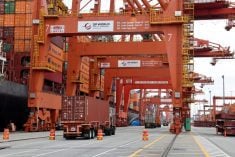The federal government says changes it is proposing to the Canadian Grain Commission should save Ottawa tens of million of dollars annually. That has some farm organizations questioning who will pick up the slack.
Terry Boehm, president of the National Farmers Union, said it is unclear how farmers will be affected but he suspects farmers will be forced to pay the costs as federal funding is pulled out.
Boehm said efforts to revamp the grain commission will mean fewer services, less protection for grain producers and a new user fees that will cost farmers thousands, if not millions of dollars more each year.
Read Also

Canadian Grain Commission to use surplus to avoid fee increases
The Canadian Grain Commission will continue to use its surplus to cover budget shortfalls and avoid potential fee increases until 2028, the federal agency announced Monday, Oct. 27.
“(Canadian Grain Commission) programs were developed in response to very real abuses that took place in the past,” he said.
“When those programs evaporate, the problems will return.”
Ottawa has signaled for two years that it intends to streamline CGC operations, eliminate unnecessary services, reduce the money the federal government contributes each year to CGC operations and transform the commission into a self-funding agency.
Last week, the federal government introduced legislation that will amend the Canada Grain Act and result in significant changes to the CGC.
Among other things, proposed changes to the commission will include:
• the elimination of the grain appeals tribunal
• the elimination of mandatory inward inspections and weighing performed by the CGC at terminal and transfer elevators
• the introduction of a new producer protection program to replace the CGC’s existing bond-based security program.
The commission will also conduct a new round of industry consultations aimed at updating user fees for all CGC services.
Doug Robertson, president of the Western Barley Growers Association, said inward inspections are a low priority for his organization and so represent an obvious area to cut costs.
“There’s no use pussy footing around. We know that farmers are going to end up having the costs rolled down to them on (all CGC services). Companies will pass those costs on somehow,” Robertson said.
“Mandatory inward inspection in particular is pretty low hanging fruit in that (regard) because most of the time, it’s just transfers between companies or transfers of grain between (facilities that are owned) by the same company.”
Robertson said his organization would have gone a step further and eliminated CGC inspections on outward grain shipped to foreign buyers.















